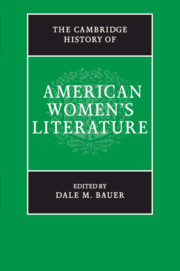Book contents
- Frontmatter
- Contents
- List of illustrations
- Acknowledgements
- Notes on contributors
- Introduction
- 1 The stories we tell: American Indian women's writing and the persistence of tradition
- 2 Women writers and war
- 3 American women's writing in the colonial period
- 4 Religion, sensibility, and sympathy
- 5 Women's writing of the Revolutionary era
- 6 Women writers and the early US novel
- 7 Women in literary culture during the long nineteenth century
- 8 Moral authority as literary property in mid-nineteenth-century print culture
- 9 The shape of Catharine Sedgwick's career
- 10 Writing, authorship, and genius: literary women and modes of literary production
- 11 Nineteenth-century American women's poetry: past and prospects
- 12 Transatlantic sympathies and nineteenth-century women's writing
- 13 Nineteenth-century African American women writers
- 14 Local knowledge and women's regional writing
- 15 Women and children first: female writers of American children's literature
- 16 US suffrage literature
- 17 American women playwrights
- 18 Turn-of-the-twentieth-century transitions: women on the edge of tomorrow
- 19 Accidents, agency, and American literary naturalism
- 20 The geography of ladyhood: racializing the novel of manners
- 21 Self-made women: novelists of the 1920s
- 22 Recovering the legacy of Zara Wright and the twentieth-century black woman writer
- 23 Jewish American women writers
- 24 Women on the breadlines
- 25 Modern domestic realism in America, 1950–1970
- 26 Lyric, gender, and subjectivity in modern and contemporary women's poetry
- 27 Contemporary American women's writing: women and violence
- 28 Asian American women's literature and the promise of committed art
- 29 Straight sex, queer text: American women novelists
- 30 Latina writers and the usable past
- 31 Where is she? Women/access/rhetoric
- 32 Reading women in America
- Index
- References
22 - Recovering the legacy of Zara Wright and the twentieth-century black woman writer
Published online by Cambridge University Press: 28 September 2012
- Frontmatter
- Contents
- List of illustrations
- Acknowledgements
- Notes on contributors
- Introduction
- 1 The stories we tell: American Indian women's writing and the persistence of tradition
- 2 Women writers and war
- 3 American women's writing in the colonial period
- 4 Religion, sensibility, and sympathy
- 5 Women's writing of the Revolutionary era
- 6 Women writers and the early US novel
- 7 Women in literary culture during the long nineteenth century
- 8 Moral authority as literary property in mid-nineteenth-century print culture
- 9 The shape of Catharine Sedgwick's career
- 10 Writing, authorship, and genius: literary women and modes of literary production
- 11 Nineteenth-century American women's poetry: past and prospects
- 12 Transatlantic sympathies and nineteenth-century women's writing
- 13 Nineteenth-century African American women writers
- 14 Local knowledge and women's regional writing
- 15 Women and children first: female writers of American children's literature
- 16 US suffrage literature
- 17 American women playwrights
- 18 Turn-of-the-twentieth-century transitions: women on the edge of tomorrow
- 19 Accidents, agency, and American literary naturalism
- 20 The geography of ladyhood: racializing the novel of manners
- 21 Self-made women: novelists of the 1920s
- 22 Recovering the legacy of Zara Wright and the twentieth-century black woman writer
- 23 Jewish American women writers
- 24 Women on the breadlines
- 25 Modern domestic realism in America, 1950–1970
- 26 Lyric, gender, and subjectivity in modern and contemporary women's poetry
- 27 Contemporary American women's writing: women and violence
- 28 Asian American women's literature and the promise of committed art
- 29 Straight sex, queer text: American women novelists
- 30 Latina writers and the usable past
- 31 Where is she? Women/access/rhetoric
- 32 Reading women in America
- Index
- References
Summary
The December 25, 1920, Chicago Defender features a “New Book on Market” review that praises Chicago-based writer Zara Wright's Black and White Tangled Threads, labeling it “a most remarkable book,” noting that “[t]o read this story will be a convincing proof that as a writer Mrs. Wright is unexcelled” (8). This review was not the only glowing endorsement of Wright's literary debut. Positive reviews marketing Wright's novel continued to appear in the Chicago Defender throughout the 1920s. A December 3, 1921 review titled “Gift Book Supreme” acknowledges that Black and White Tangled Threads had been “Endorsed by press, pulpit and public,” and that the book's author tells a “story that will stand as a monument of greatness in the future years” (5). Similarly, an advertisement in the December 10, 1921, Chicago Defender boasts that the novel is “Unquestionably the best book ever written by one of our own authors…No home should be without this wonderful book” (4). Moreover, Black and White Tangled Threads appears on a “Survey of Negro Life in Chicago: Books You Should Know and Read” list that promotes the most important books by “Negro” and white authors (Fig. 22.1). Wright's name appears alongside prominent black writers such as Phillis Wheatley, Sojourner Truth, Paul Laurence Dunbar, W. E. B. Du Bois, Jessie Fauset, and Angelina Weld Grimké. Wright's portrait also appears in John Taitt's 1925 Souvenir of Negro Progress.
- Type
- Chapter
- Information
- The Cambridge History of American Women's Literature , pp. 446 - 457Publisher: Cambridge University PressPrint publication year: 2012



